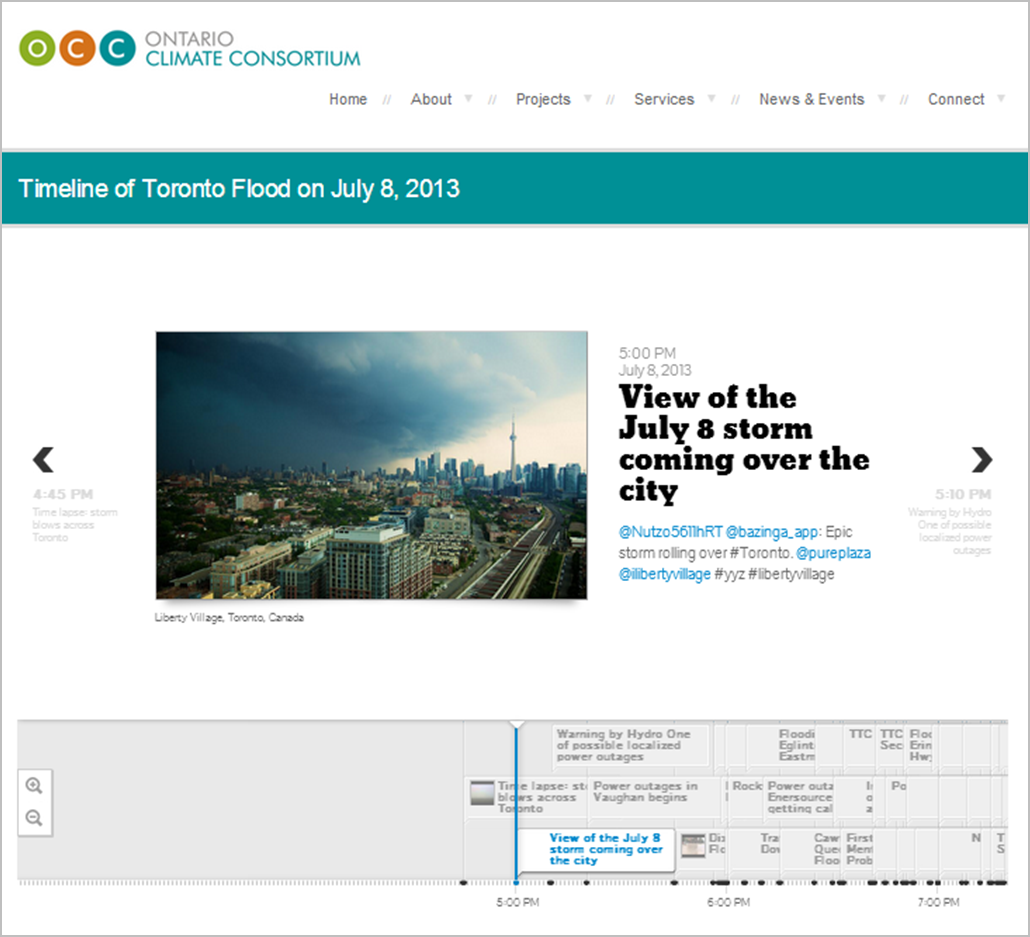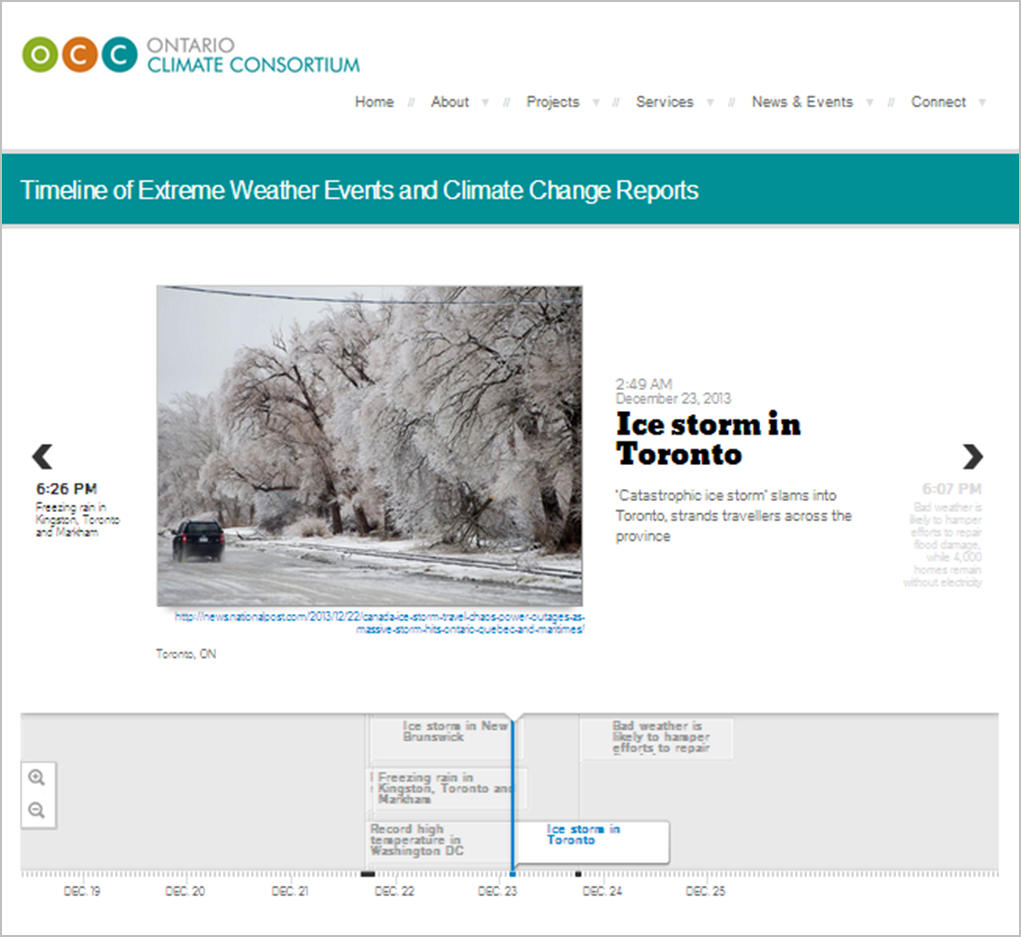July 10, 2014
A Year of Extremes | Tracking Change with Twitter and JS Timeline

At roughly this time last year, Toronto and Calgary were both affected by record breaking flood events. The flooding in Toronto on July 8th resulted in damages totaling $940 million making it the costliest extreme weather event in Ontario’s history and the third most costly event in Canadian history. Insurance claims for the flooding event in Calgary in June 2013 exceeded $1.7 billion which made it the costliest event in Canadian history. As storm clouds and severe thunderstorm warning were issued for Toronto on July 8 2014 one couldn’t help but feel a little nervous – at the time of posting this blog no equivalent disasters had been reported in Toronto. That being said, in the southern prairies over 40 communities declared a state of emergency at the end of June 2014 as a result of widespread flooding. The prairies were impacted by similar flash flooding in the summer of 2011 which also saw the very same communities declaring a states of emergency. The records set in 2011 are unfortunately at risk of being broken only three years later.
Following the massive flooding in Toronto, the OCC undertook an initiative to use an application called JS Timeline developed by the Knight Lab at Northwestern University to track reporting on the flood’s impacts via media and social media (Twitter, Facebook). Building on that impromptu pilot, the OCC undertook a small initiative to track and compile a list of extreme weather events reported in both Canada and across the globe. Also included in the timeline are key climate change reports that have been published since July 2013. While this is not an exhaustive list, it provides a good overview of the different types of extreme events that have occurred in that period. On the anniversary of these two significant events we wanted to share our findings and hopefully begin a larger discussion around climate change and extreme weather impacts.
Going through the timeline, it is interesting to see the number of tornadoes, droughts, and floods that have occurred over the last year. Once again, Ontario made the list for the ice storm that occurred in late December 2013. Another interesting phenomenon of note were the frost quakes that occurred in the Greater Toronto Area (GTA) in early January. We could get into an entire discussion regarding the ‘polar vortex’, but let’s leave that for another day. There were other major storms that occurred internationally over the past year that had major impacts in different areas. In the summer of 2013, eastern Russia was faced with the worst flooding it had seen in 100 years. In early January, a one-in-500 year flood occured in Germany. Gaza was faced with a once-in-a-century storm in December which resulted from torrential downpours and snowfall. Brazil was hit by deadly flooding in December following its worst drought in 50 years. In North America, California has been dealing with a drought that began in December 2013 – the implications of which are still emerging. These are just some examples of the low probability, high impact events that have occurred over the last year.
 Overall, it is evident that across the planet communities and entire regions are being impacted by extreme weather events. International organizations and the national governments are worried. While is is difficult to associate one extreme event with climate change, it is generally acknowledged that climate change may result in a higher frequency and severity of extreme weather events. This is reality is acknowledged by the international community (SREX Report) and most recently the Canadian Federal government in their climate change report. These publications among others including one released by the Environmental Commissioner of Ontario on July 9th serve to highlight the concern associated with an increasing trend in the frequency of extreme weather events and their associated impacts.
Overall, it is evident that across the planet communities and entire regions are being impacted by extreme weather events. International organizations and the national governments are worried. While is is difficult to associate one extreme event with climate change, it is generally acknowledged that climate change may result in a higher frequency and severity of extreme weather events. This is reality is acknowledged by the international community (SREX Report) and most recently the Canadian Federal government in their climate change report. These publications among others including one released by the Environmental Commissioner of Ontario on July 9th serve to highlight the concern associated with an increasing trend in the frequency of extreme weather events and their associated impacts.
These events in turn have major financial implications for municipalities in Canada as well as communities around the world. Our small initiative represents an effort towards better understanding and communicating the extent to which extreme weather continues to impact the communities where we live, work and play. We’ve found our timeline project helpful in visually depicting the sheer number of challenges we face – that being said, a incredible opportunity still exists to proactively address climate impacts and hopefully mitigate the effects of a changing climate. For more on this you may wish to check out the recent Deep Decarbonization Pathways Project (DDPP) (again released this week) focused on describing practical steps towards a low-carbon economy that addresses both climate change and larger international development objectives. We’ll add it to our list and keep our fingers crossed – hopefully it will be a slow ‘extreme weather’ week for Ontario.
About the bloggers
Stewart Dutfield is a program and communications manager with the Ontario Climate Consortium. His interests lie in climate change risk management and climate change communications. Simran Chattha is a research analyst with the Ontario Climate Consortium. Her research interests lie in the areas of environmental policy and climate change adaptation.


 Overall, it is evident that across the planet communities and entire regions are being impacted by extreme weather events. International organizations and the national governments are worried. While is is difficult to associate one extreme event with climate change, it is generally acknowledged that climate change may result in a higher frequency and severity of extreme weather events. This is reality is acknowledged by the international community (
Overall, it is evident that across the planet communities and entire regions are being impacted by extreme weather events. International organizations and the national governments are worried. While is is difficult to associate one extreme event with climate change, it is generally acknowledged that climate change may result in a higher frequency and severity of extreme weather events. This is reality is acknowledged by the international community (
Comments are closed here.